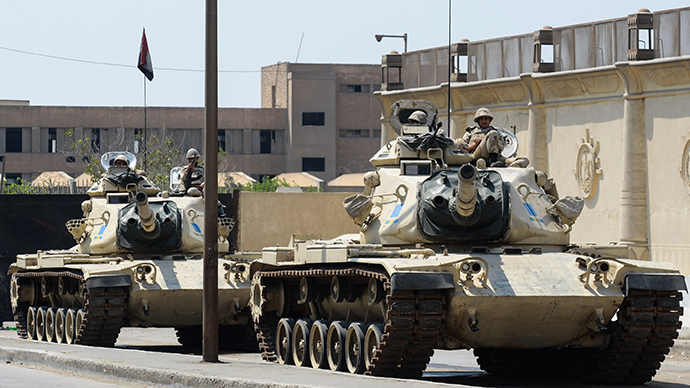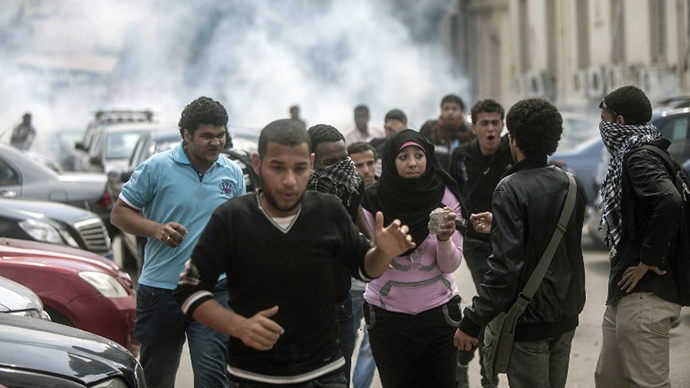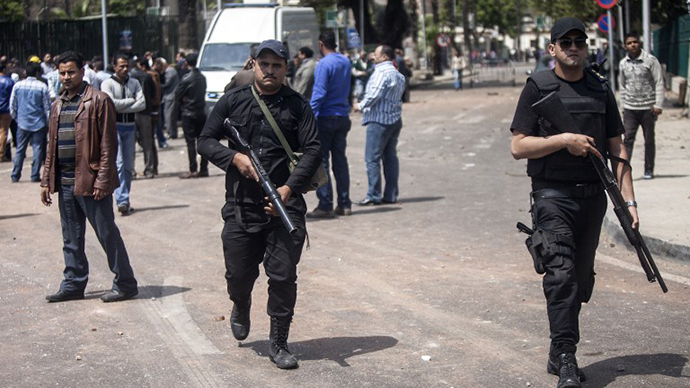Has Egypt learned the lesson of electing military leaders?

The predicted election as president of Field Marshal al-Sisi will lead to a new decade of rule by the country’s military junta, setting back again the will of the people and making the sacrifice of the victims of the 3-year-revolution meaningless.
On March 30, Egypt’s electoral commission announced that presidential elections would be held on May 26-27. The election commission said the results are expected by June 5, but if a second round is necessary, it will be held by mid-June, and consequently, the results to be announced no later than June 26.
Limited choice
Three years of unrest, laws and regulations either changed or amended, a new Constitution voted for in the referendum, new political parties created, the ex-President imprisoned (again) with Muslim Brotherhood labeled as “terrorists,” the dates for the presidential elections set – and still, Egypt is unlikely to progress on the road to democracy. The upcoming elections with only three candidates that have announced their presidential bids are just one of the proofs of this.
Paradoxically enough, no one seems to be willing to run for office, while still moaning and demanding democracy and respect for human rights. This is really a paradox, given that there is no unanimity within society about political preferences and the country’s course for development. Indeed, many Egyptian cities are witnessing constant demonstrations in support of the initial revolutionary ideals, against military rule, in support of Morsi and Muslim Brotherhood, as well as in support of al-Sisi, the general who ousted Morsi last summer. But for the moment there are only three candidates for president: the leader of the Egyptian Popular Current party Hamdeen Sabbahy, lawyer and an independent candidate Mortada Mansour and al-Sisi, who was promoted to Field Marshal in January and resigned from the army on March 26.
The Nour Party and the New Wafd Party stated they would not nominate anyone for the presidency. The Salafist Front has not decided on a stance toward the elections. The Dostour party, founded by Mohamed el-Baradei, decided not to field a candidate either. The current interim president, Adly Mansour, stated in November 2013 that he would not run.
Ahmed Shafiq, who finished second in the 2012 presidential election, announced on March 20 that he would not run for president. Abdel Moneim Aboul Fotouh and Amr Moussa, who finished fourth and fifth, respectively, in the 2012 election, declined to stand as well. On March 13, Lieutenant General Sami Anan announced he would not run either. Khaled Ali, a labor lawyer and former presidential candidate, withdrew his candidacy March 16. Another candidate, Murad Muwafi, announced March 30 that he also would not run. The main reason these would-be candidates gave for not standing was the impossibility of a fair election in the current political atmosphere, when critics of the state are being arrested. This argument points to the recent scandal with Egypt's judicial system holding mass trials of hundreds of people and sentencing 529 men to death after a two-day trial. In particular, some trials and detentions were specifically targeted at members and supporters of the Muslim Brotherhood.
"It's nonsense that the armed forces support a candidate for the presidency,” Shafiq said March 13. “It's unprecedented. I have taken myself out of this loop because the election is going to be a farce... They will fix everything for him [Al-Sisi]... This is going to be a comedy show."
Abdel Moneim Aboul Fotouh, the Strong Egypt Party's presidential candidate, said his party would boycott the vote so as "not to take part in deceiving the people."

Sabbahy was the first to officially announce his candidacy. A supporter of the nationalist principles of Egypt’s famous military leader Colonel Nasser, Sabbahy came third behind Shafiq, Mubarak's former prime minister, in the 2012 elections that brought Morsi to power. During the Mubarak's rule Sabbahy was arrested 17 times for political dissent. Now he is seeking to build a wider political coalition through talks with the Dostour and Wafd parties. Although Sabbahy has repeatedly criticized the “unconstitutionality of the presidential elections law” promulgated by the interim government, his political campaign seems to be already in full swing, given the number of meetings he has held with other political forces over the past month.
However, many Egyptians and world leaders were waiting for al-Sisi to be officially nominated. He is widely expected to win the presidency, given his popularity and the lack of any serious rivals. As defense minister, he had to formally leave the army to run for president since only civilians can stand, according to the Constitution. He has to collect at least 25,000 signatures from 15 out of Egypt's 27 provinces in a petition supporting his candidacy. Al-Sisi isn’t planning to hold a traditional political campaign, however, most likely over concerns for his security.
Déjà vu
According to a recent poll held March 24-26 by Baseera, 39 percent of Egyptians said they would support al-Sisi at the polls.
In fact, a previous poll that took place at the end of February and the beginning of March showed broader support for al-Sisi, with 51 percent of those interviewed saying they would vote for him.
Though the level of his support has decreased, al-Sisi still remains the favorite in the race.
If al-Sisi does become president, he will be the another one in a line of Egyptian rulers drawn from the military, a line only briefly broken during President Morsi's year in office. In other words, his victory would restore a tradition of presidents with military backgrounds that Egypt had since 1952. Nasser, Sadat and Mubarak were all military men.
Do Egyptians prefer military men leading the state, whereas civilian candidates are doomed to fail?
Military candidates, including al-Sisi, are believed to be strong men able to secure the country’s stability and prosperity. Al-Sisi is seen as someone able to end the turmoil that has dogged Egypt since a popular uprising in 2011 ended Hosni Mubarak's three decades of rule. It was al-Sisi who led the military coup aimed at overthrowing Morsi and who backed a political road map that promised presidential and parliamentary elections. He became the youngest member of the Supreme Council of the Armed Forces (SCAF) and then its key public face. Widely known as a devout Muslim by virtue of his conservative family life, his fondness for using phrases from the Quran in everyday speech, and by his advocacy of Islam to Western audiences, Al-Sisi managed to gain trust of the Muslim Brotherhood and was nominated by then-President Morsi as commander-in-chief and defense minister. Al-Sisi was considered by the Muslim Brotherhood as “their man,” but this was a huge mistake.

Since Morsi's overthrow, more than 1,000 people have been killed and thousands of Muslim Brotherhood members have been detained in a crackdown by the interim authorities, who have designated the Islamist movement a terrorist group. The interim government blames the Brotherhood for orchestrating the violence, a claim the group denies, blaming itself the military. In general, it’s quite clear that the military-backed authorities are showing extreme hostility to their political opponents, as well as to the independent media, given the detention of Al-Jazeera journalists over alleged links to terrorists. In two big respects, the absence of political competition and the reintroduction of censorship, it looks like a return to the Mubarak era.
Another important aspect concerns the fact that the military own or control around 40 percent of the Egyptian economy, from hotel resorts to petrol stations, and those businesses under their control have tend to get tax exemptions. In 2011, the Egyptian Army loaned $1 billion to the country’s central bank after it rejected a proposed deal with the IMF that would have seen widespread privatization. Recently, the Dubai-based construction firm Arabtec signed a $40 billion deal with the Egyptian Army. Those facts are just tip of the iceberg when talking about the power and influence that the military wields.
The new Constitution also gives the military even more authority and privileges. For instance, now the army has its own constitutional institute, which has not only military duties, but can interfere with the political process.
This means that army has already become much stronger than in the times of Mubarak and Morsi, and is likely to improve its position after al-Sisi takes office as president. This is worrying, isn’t?
RIP Egyptian revolution
Al-Sisi is calling for the regeneration of Egypt, and for it to meet all the challenges the state has faced in recent years. He is promising to provide Egyptians with “a better life, full of dignity, security and freedom.”
“They [The Egyptians] deserve to have a job, food, education, medical treatment and affordable homes. This should be available to all Egyptians,” al-Sisi declared on March 28.
The principal theme of his presidential campaign so far is counter-terrorism and establishing stability on the ground.
“We are threatened by terrorists, by parties who seek to destroy our life, safety and security. It is true, this is my last day in uniform, but I will fight every day for an Egypt that is free from fear, panic or terror, not only Egypt but the entire region, God willing. I repeat what I have said before: we would rather die than allow Egyptians to be intimidated,” he said.
He also declared that Egyptians will have to "put their trust in God, the army and the civilian police to bring freedom, stability and progress to Egypt."
As regards forthcoming elections, Al-Sisi said he supports the right of other presidential candidates to stand, and said he was ready to accept failure.
“I want to affirm that my nomination for office should not deny others their right and duty to run if they regard themselves as competent,” he said. “I will certainly be happy to accept the choice of the people and the winner of the voters' confidence.”
“Never can anyone force Egyptians to vote for a president they do not want. This is a fact. Therefore, I am here and, in all humility, I come before you to announce my intention to run for president of the Arab Republic of Egypt. Only your support will grant me this great honor,” al-Sisi said.
Al-Sisi’s claims are indeed honeyed and encouraging. Nevertheless, his economic policy is shrouded in ambiguity, the military crackdown on Islamists is a dangerous sign, as is setting limits on press freedom. Besides, violent protests as well as terrorist attacks still take place, so the question is whether Al-Sisi really corresponds to the people’s aspirations. The answer is “no.”
The military does indeed remain the most trusted institution in the country – as trusted as al-Sisi, who has been practically ruling the country after Morsi was ousted. However, during this time no improvements in terms of security have been reached. For instance, on March 30 unknown gunmen opened fire on a security personnel carrier in Egypt's Sinai region, killing one soldier and injuring three policemen. So if during this time al-Sisi hasn’t managed to return stability to Egypt, can he do it after becoming president? There are two possible answers to this question: either he is hiding his talents so as to impress people after gaining the votes, or he is just incapable of satisfying people’s demands.
Above all, the election of al-Sisi will mean history is repeating itself. Some of the 2011 revolution demands are already being violated, while electing a military man as head of state will create another military junta regime with hardly any benefits for the people.
Irina Sukhoparova, RT
The statements, views and opinions expressed in this column are solely those of the author and do not necessarily represent those of RT.
The statements, views and opinions expressed in this column are solely those of the author and do not necessarily represent those of RT.












